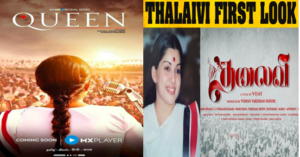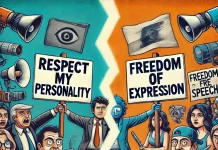Late AIADMK chief Jayalalithaa’s niece, Deepa Jayakumar, has moved the Madras High Court, seeking a stay on two in-production projects, allegedly based on the former Tamil Nadu Chief Minister’s life. Deepa Jayakumar is concerned about the honesty with which the two projects –a film “Thalaivi” and a web series “Queen”- will tell the politician’s story.
The suit has been filed against Mr. A.L Vijay, Mr. Vishnu Vardhan Induri and Mr. Gowtham Vasudev Menon.
Mr. A.L Vijay is the director and Mr. Vishnu Vardhan Induri the producer of the film “Thalaivi” which us supposed to star Kangana Ranaut in the lead role.
Mr. Gowtham Vasudev Menon is the director of the web series “Queen” starring Ramya Krishnan in the lead, which is to be streamed on MX Player.
The suit has been filed for declaration to declare that the defendants do not have the legal right, power or authority to release the film or the web series in the name of Jayalalitha on her life or her family members without seeking the consent of the Plaintiff. She has further sought permanent injunction restraining the defendants from the releasing the said projects without her consent.
The Plaintiff claims that the biopic would amount to interference of the privacy of the Plaintiff. More so that she is not aware of the script prepared by the defendants and she fears that the defendants may portray Jayalalitha and her personal life in the life story and the Plaintiff’s part in the life story may also be depicted by the Defendants in their own version which would affect the family privacy and the Applicant’s privacy. She further states that it is necessary for her to check and confirm the story to ensure that it maintains the dignity of Jayalalitha and that she suspects that the Defendants have interpolated the scenes which would affect the dignity of the former chief minister.
Therefore, with a view to safeguard the interest of the personality rights of Jayalalitha and the privacy rights of the Plaintiff and her family, she has sought that it is absolutely necessary for her consent to be taken for the production of the film or web series
The court is expected to take up the suit for hearing on November 4.
What is the legal position on making films on the life of a public figure?
The right to privacy under Article 21 of the Constitution of India protects individuals against unlawful government invasion. This was illustrated in R. Rajagopal V/s. State of Tamil Nadu (Autoshankar case) in which restrictions on the usage of a person’s biography were envisaged.
The Supreme Court laid down the following broad principles:
- It held that right to privacy is implicit in the right to life and property guaranteed to the citizens of this country by Article 21 of the Constitution, consent and public record being exceptions in contravening the right to privacy.
- Public Records: It had been held by the Supreme Court that anybody is allowed publish the life-story of a person relying on the facts and content derived from public records, even without the consent or authorization of that person and his/her family members. However, going beyond that and publishing his life story would amount to invasion of his right to privacy and will be liable for the consequences in accordance with law. Therefore, it can be said that, although every citizen of India has a right to privacy under Article 21 of the Constitution, any information based on public records could be published by the press. When the scenes are based on public records, including the Court records, right to privacy no longer subsists and it becomes legitimate subject for comment by press and media, among others.
- Exception to protect a woman’s dignity: However, an exception has been carved out to the aforesaid rule in the interest of decency [Article 19(2)] viz., a female who is the victim of a sexual assault, kidnap, abduction or a like offence should not further be subjected to the indignity of her name and the incident being publicised in press/media.
- Public Officials: In the case of public officials, right to privacy as well as the remedy for damages is simply not available with respect to their acts and conduct relevant to the discharge of their official duties. This is so even where the publication is based upon facts and statements which are not true, unless the official establishes that the publication was made with reckless disregard for truth. There is no law empowering the State or its officials to prohibit, or to impose a prior restraint upon the press or media. The remedy of public officials or public figures, if any, will arise only after the said publication.
Interestingly, Jayalalitha has herself filed a case against Penguin Books India for permanent injunction restraining the defendants from publishing the book, namely “Jayalalithaa A Portrait”. While granting injunction against publication of the Book, the Madras High Court held that the defendants had not taken any authorization from the Plaintiff to write a book on her life in the name of Jayalalithaa A Portrait or as a biography. The Court further held that the private life of the plaintiff written was not involved with the public activities, which is an exception as per the judgment of the Hon’ble Apex Court in Autoshankar’s case. Accordingly injunction was granted against publication of the book.
Veerapan’s wife had also filed a case against a film being based on Veerapan’s life. In Akshaya Creations v/s Muthulakshmi, in relation to the film “Vana Udham” in Tamil and “Attakasa”, the court relied on the Supreme Court decisions in (i) R. Rajagopal and Anr vs State of Tamil Nadu [1994 (6) SCC 632] in which the Supreme Court had clarified that though every citizen had right to privacy under Article 21 of the Constitution, any information based on public records could be published by the press. The Court also made it clear that the State and its officials did not have any privacy rights (ii) R.Rajagopal & Anr. v. Jayalalitha & Sasikala[ (2006) 2 CTC 35] wherein the Court had held that public personalities cannot expect the same degree of privacy as ordinary people (iii) C.B.F.C. v. Yadavalaya Films [2007 (1) CTC 1] wherein the Court set aside the objections of the Censor Board and allowed the release of the film depicting the assassination of Rajiv Gandhi. Relying on these judgments and since the petitioner agreed to delete the marriage scenes between Veerapan and his wife (Respondent) , the court concluded as under: “Therefore, having regard to the law laid down by the Hon’ble Supreme Court in the aforesaid judgment, and having regard to the undertaking given by the learned Senior Counsel for the revision petitioners, that the revision petitioners would delete those scenes, as stated above, I am of the opinion that the right of privacy of the first respondent is in no way affected and there is no right of privacy available to the first respondent, as the Film is taken on the basis of the Police records and the first respondent has no cause of action, restraining the revision petitioners from exhibiting, exploiting the said Film.”
Ms. Muthulakshmi thereafter filed a special leave petition before the Supreme Court against the Madras High Court order. However the matter was ultimately compromised between the parties.
In Justice K.S Puttaswamy (retd.) V. Union of India and ors (privacy right judgement), the Supreme Court held that “Every individual should have a right to be able to exercise control over his/her own life and image as portrayed to the world and to control commercial use of his/her identity. This also means that an individual may be permitted to prevent others from using his image, name and other aspects of his/her personal life and identity for commercial purposes without his/her consent.”
Conclusion:
There are two elements to be considered here:
- Right to privacy: It is established that so long as the public life of the public figure is shown it would not amount to violation of right to privacy. However, it is debateable whether the privacy rights would extend to the deceased. In Justice K.S. Puttaswamy (Retd.) & another v. Union of India Justice Abay Chandra Sapre has observed that privacy is a right that remains with the human being till he/she breathes last. In other words, it is born with the human being and extinguish with human being. However, courts have recognized right to dignity even after the death of a person to fall under Article 21. Hence if the personal life of the deceased is shown in a manner which would affect her dignity, the Plaintiff would have an arguable case.
- Personality rights: Courts have recognized and protected right to publicity/ derive commercial benefits out of one’s life story in certain cases. In Shivaji Rao Gaikwad vs. Varsha Productions, superstar Rajnikanth filed a suit seeking injunction restraining the respondent from using the applicant’s name/caricature/ style of dialogue delivering etc. in its forthcoming film “Main Hoon Rajnikanth” in any manner whatsoever alleging infiltration of his personality rights by such unauthorized use. Rajnikanth also expressed distress that the film had scenes of immoral nature and the respondent was trying to cash in on his popularity. The Court recognized the personality rights of Rajnikanth and had granted injunction on the movie. If the Plaintiff Deepa Jayakumar is able to establish a personality rights violation case and further that such rights are inherited by legal heirs, she may have a good case.
Mostly in such situations where filmmakers do not obtain consent from heirs/ personalities they show the content to be a hybrid of facts and fiction with adequate disclaimers to that effect. Fictional names are used and the content is shown as inspired by true story. Courts have protected film makers in such cases on the basis of disclaimers. Some examples include the recent Batla House case, Gulabi gang case, etc.
Some of the earlier similar issues have been covered by us :
- Sanjay Dutt’s Unauthorized Biography: Personality Rights Issues Involved- link here
- Madras High Court restrains Tamil magazine ‘Kumudam Reporter’ from publishing articles on ‘private life’ of DMK leader Kanimozhi- link here
- Rifleman Jaswant Singh Rawat’s family moves Delhi High Court against Sandhya Entertainment over making a biopic without their consent- here
- Anandbabu s/o. Late C.K. Nagesh vs. M/s. Transindia Media & Entertainment Pvt. Ltd – Madras HC directs ‘Nagesh Thiraiarangam’ producers to carry explanatory note- link here
- Gangster ‘Abu Salem’ Sends Legal Notice to Makers of ‘Sanju’ Alleging Defamation- link here
- Freedom Of Expression In Context Of “The Accidental Prime Minister”- link here
- Ex Bandit Malkhan Singh and Jandel Singh move Gwalior Bench of Madhya Pradesh High Court Against Sonchiraiya – here
A list of judgements on personality and privacy rights can be viewed in the judgement section here.
Image sources: here and here




















[…] Read details of the matter here. […]